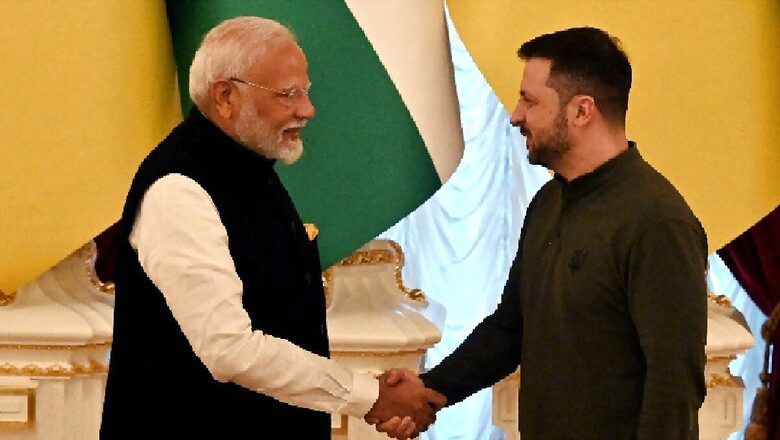
views
Navigating the Russia-Ukraine conflict diplomatically has been difficult for countries like India with historically close ties with Russia and also good ties with Ukraine.
The West has given huge support to Ukraine, seeing in the conflict a possibility to durably weaken Russia as a military and economic pole, and change the balance of power not only in Europe but globally as well. India does not see this in its interest, as this will retard the emergence of a multipolar world, thwart the goal of diluting Western hegemony on global affairs, and forestall India’s hope of playing a bigger role in a reformed international system.
The West has put open pressure on India to dilute its ties with Russia, which India has rebuffed The West is unhappy with India but also does not want to alienate it by pushing beyond a point on this issue. It wants India to remain tied to the West politically, economically and technologically. India, in turn, has shown readiness to deepen ties with the West, but also wants to preserve the independence of its foreign policy.
India has maintained contacts with Ukraine, with Prime Minister Narendra Modi meeting President Volodymyr Zelenskyy at multilateral forums like the G7, and has had telephonic conversations with him. India’s National Security Adviser has been in touch telephonically with the Head of Office of Zelenskyy. The Ukrainian Foreign Minister has visited India too. India has participated in several conferences organised to discuss Zelenskyy’s 10-point peace plan, either at NSA, Deputy NSA or at the level of the Secretary in the Ministry of External Affairs. India, however, refused to invite Zelenskyy to the G20 summit under its presidency despite Western appeals.
Modi’s decision to resume the summit level meetings with Russia by his visit to Moscow in July this year which coincided with the NATO summit in Washington D.C. was perceived very negatively by the US. That despite Russia’s alleged bombing of a children’s hospital in Kiev, Modi embraced Putin as they greeted each other in Moscow caused a lot of moral outrage (fake) in the US and was virulently commented on by Zelenskyy.
There has been much talk in the West and its echo chambers in India about India playing some active role in promoting peace in Ukraine, the argument being that Modi had credibility with all sides, had succeeded in bridging differences between Russia and the West on Ukraine at the G20 meeting under its presidency, and also represents the voice of the global south in seeking an end to this conflict. India, it has been argued, had very good ties with Russia and could exert some influence on Putin. Behind this is also a desire to change India’s posture and drive a wedge between India and Russia.
In various multilateral forums and bilateral talks, Modi has been stressing the imperative of dialogue and diplomacy in resolving the Ukraine conflict. During his recent visit to Moscow Modi, while repeating to Putin that today was not an “era of war” had added that no solution could come from the battlefield. This seems to have created momentum for Modi to visit Ukraine to press for dialogue and diplomacy. By doing this India has no doubt calculated that this would remove a point of pressure on India by the US.
The route to Ukraine today lies through Poland by train. Inevitably, therefore, Modi’s visit to Ukraine has had to be tied to a visit to Poland too. It can be argued that a visit to Poland could have taken place earlier on the strength of its own merits. Poland has been doing very well economically and represents a power shift within the European Union (EU), especially because of the importance the US attaches to it strategically as “new Europe’s” frontline state against Russia.
Nothing new has emerged in Poland’s profile which would explain a prime ministerial visit from our side at this juncture. To read into the visit a new focus by India on central and eastern Europe as distinct from our traditional focus on the major European powers such as France and Germany would be over-interpreting the reasons for the visit, even though a renewed focus on Poland as a partner would be desirable in order to broaden our engagement with major EU countries.
In fact, the timing of the visit was not the most opportune because of the war in Ukraine in which Poland is deeply involved. Its historical bitterness towards Russia has been sharpened by Russia’s military intervention in Ukraine. India, of course, would not want to get tangled in this web of traditional Polish-Russia antagonisms.
The joint statement issued on the occasion of Modi’s visit to Poland has succeeded in drafting agreed language on the Ukraine conflict notwithstanding the widely divergent positions of the two sides on the issue. Not mentioning Ukraine at all because of differences would have been unacceptable to the Polish side and therefore they have had to agree to a language which is politically comfortable for the Indian side. There is thus the usual reference to “a comprehensive, just, and lasting peace in line with international law, consistent with the purposes and principles of the UN Charter, including respect for sovereignty and territorial integrity” India brought in its concerns about “the negative impacts of the war in Ukraine with regard to global food and energy security, especially for the Global South.”
Rather oddly, the joint statement says that “The two leaders underscored that as the world’s two largest democracies, the EU and India have a common interest in ensuring security, prosperity and sustainable development in a multi-polar World”. Why not Poland and India? For Poland, this would have been difficult as multipolarity is being pushed by Russia, China, the BRICS and some members of the global south, and is seen as directed at the US’s unipolar tendencies. Poland obviously. did not want to support this concept in its own name, given its very close ties with the US.
The joint statement says “In the context of this war, they shared the view that the use, or threat of use, of nuclear weapons is unacceptable”. Why in the context only of this war? It should have been phrased as a general proposition. Clearly, the nuance in this formulation is tilted against Russia. India has gone along with it, keeping in mind that China too has endorsed such language in the Ukrainian context.
Unlike Ukraine, with which we baulked at elevating ties from a Comprehensive Partnership to a strategic partnership and left it for the future, and which has supported India’s candidature for permanent membership of the UN Security Council, Poland has not supported India’s candidature despite the agreement to elevate ties to a strategic partnership.
With Ukraine, finding agreed language on the Ukraine-Russia conflict was not an easy task. The joint statement with Ukraine talks in general terms of “upholding principles of international law, including the UN Charter, such as respect for territorial integrity and sovereignty of states”. India has mentioned its “principled position and focus on peaceful resolution through dialogue and diplomacy, as a part of which, India has attended the Summit on Peace in Ukraine, held in Burgenstock, Switzerland, in June 2024”, a formulation that Ukraine has not endorsed.
The Ukrainian side has limited itself to highlighting “the importance of high-level Indian participation in the next Peace Summit”, and stated that “the Joint Communiqué on a Peace Framework, adopted at the Summit on Peace in Ukraine, could serve as a basis for further efforts to promote just peace based on dialogue, diplomacy, and international law”. In other words, the template for any dialogue and diplomacy has to be Zelenskyy’s 10-point peace formula. This does not give India much room to manoeuvre.
This difference in approach has been further reflected in the joint statement which says that “Prime Minister Modi reiterated the need for sincere and practical engagement between all stakeholders to develop innovative solutions that will have broad acceptability and contribute towards early restoration of peace.” This formulation is very different from what Ukraine and its supporters are pushing. While Modi has reiterated India’s willingness to contribute in all possible ways to facilitate an early return of peace, the gap between Indian and Ukrainian positions is wide, and this came out also from the press briefing by the External Affairs Minister in Kiev.
The joint statement refers to the potential of enhanced cooperation in areas such as trade and commerce, agriculture, pharmaceuticals, defence, education, science & technology, culture, digital public infrastructure, industry, manufacturing, green energy, etc, which is to be explored by the existing Inter-Governmental Commission. The sides have agreed to hold the 2nd meeting of the Indian-Ukrainian Joint Working Group on Military-Technical Cooperation, established under the 2012 Defence Cooperation Agreement, in the near future in India. The sides also agreed to explore the possibility of involvement of Indian companies in Ukraine’s reconstruction and recovery, in a suitable manner. Modi has invited Zelenskyy to visit India at a mutually convenient opportunity.
While in Kiev, Modi embraced Zelenskyy on three occasions, lay his arms on his shoulder and held his hand while visiting the exhibition on children killed in the war. Since for the West Modi embracing Putin was a geopolitical event, Modi embracing Zelenskyy even more generously should settle the geopolitical score.
Unfortunately, Zelenskyy has been lionised so much by the West that he believes he has achieved stardom status, and for him, showmanship and grandstanding are a substitute for mature diplomacy. In his meeting with the Indian press, he questioned India’s continuing purchase of Russian oil, an issue on which India has explained its position numerous times, including in the official talks at Kiev. This urge to put India morally on the defensive is petulance, especially when Europe continues to buy oil, gas, coal and precious metals from Russia.
He tried to manipulate the Indian press by claiming that Russia bombing the children’s hospital in Kiev showed that Putin had no respect for Modi. It is India that has to be a judge of the Modi-Putin equation. Why try to do propaganda at this low level? He also diminished Modi’s bid to advocate peace by stating to the press that India could be part of a peace plan but Ukraine will not compromise on principles and values.
Worse, on the question of the next peace summit being held in India, he said quite presumptuously that he had told Modi frankly that the next peace summit could not be held in a country that had not joined the communiqué of the first summit. On his visit to India, he said he would want to visit early but that he wanted India to be on his side and “not balancing between us and Russia”. There is little subtlety and nuance in Zelenskyy’s style of diplomacy. He has a sense of entitlement and has been arrogant with his benefactors too, such as the US, UK, France, Germany, Poland, etc.
On balance, by visiting Poland and especially Ukraine, Modi has broadened the base of Indian diplomacy. The Russian media reaction to the visit has been equable, possibly because official Russia was confident that India would do nothing to harm Moscow’s interests.
Kanwal Sibal is a former Indian Foreign Secretary. He was India’s Ambassador to Turkey, Egypt, France and Russia. Views expressed in the above piece are personal and solely that of the author. They do not necessarily reflect News18’s views.




















Comments
0 comment